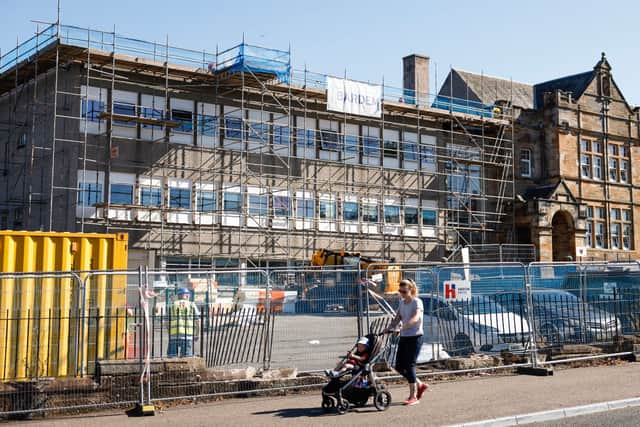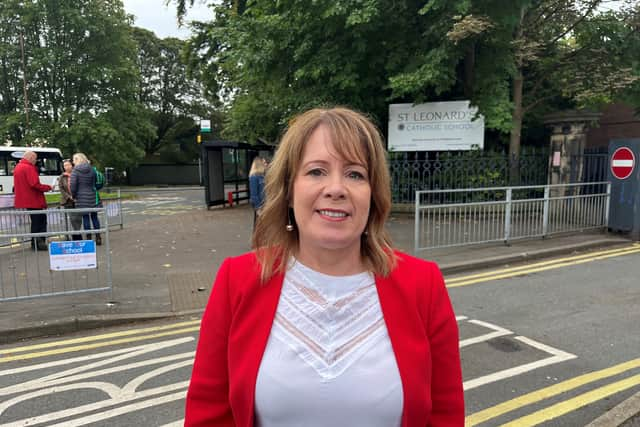RAAC schools: 'forgotten' children still learning from home due to crumbly concrete
and live on Freeview channel 276
At the beginning of September, Lily Smith started Year 10. Her first half-term should have involved mixing with classmates, diving into new subjects, and receiving support from teachers to help her prepare for her GCSEs. Sadly, this wasn't the reality at all.
Just days before the start of the new academic year, the Department for Education (DfE) announced that more than 100 schools across England would be forced to close over fears they could 'collapse' - as they had been constructed with 'crumbly' reinforced autoclaved aerated concrete, known as RAAC.
Advertisement
Hide AdAdvertisement
Hide AdSt Leonard's Catholic School in Durham, where Lily attends, was one of those with RAAC - and was therefore unable to open. Helen Smith, Lily's mother, told NationalWorld that families were informed of this via an email from the headmaster, which simply said the school would be closed for the next week.
"There was no further information," Helen explained. "We didn't know when our kids would be going back to school, or what would happen if they weren't able to. It was all very uncertain."
After missing a week of school, students at St Leonard's were informed that they would start learning at home via Microsoft Teams calls. "It was like being back in the pandemic," Helen explained. "Lily was struggling to get out of bed in the mornings. She was isolated, not seeing any of her friends because everything was remote.
"They were also teaching an entire year group on one call, so there was no individual or targeted support from teachers. Lily wasn't engaging at all. She may as well have been listening to a recording."


Advertisement
Hide AdAdvertisement
Hide AdHelen explained that now, nearly two months on, learning is partially remote and partially in-person - but things are "still a mess". Some students are having classes at Durham's Radisson Blu Hotel, and Year 7s and 8s are learning at nearby Ushaw College.
Lily's lessons are primarily in the sixth-form area at St Leonard's, but classrooms can change at the last minute - and they only find out which days of the week they will be remote and which days they will be in-person late on a Friday. This is particularly challenging for Lily, as she has very high levels of anxiety and needs a routine.
"Her anxiety is heightened at the moment because of the disruption," Helen explained. "One day she came home from school stressed because she had been in the wrong English class all day, but no one had noticed. She isn't one to make a fuss, so didn't say anything, but the onus shouldn't be on her as the student anyway."
Because of her anxiety, Lily is a SEN (special educational needs) student. This means she should be receiving extra support from teachers, but this hasn't been happening due to the chaos caused by RAAC.
Advertisement
Hide AdAdvertisement
Hide Ad"Lily used to have time with her form tutor, and there were teachers she could chat to when she was struggling," Helen explained. "But that isn't possible now because teachers are being run into the ground, trying to get to different locations, trying to teach more classes than before... it's impossible."
Concerned, Helen wrote to the school's SEN team - explaining that Lily was not engaging in her lessons. "The response? They said she could choose which lessons she was struggling with and not attend them," Helen said. "That's just not good enough. They should be looking at ways they can help her engage, encourage her attendance. So I feel massively let down by the school, especially from an SEN perspective."


There is already concern spreading among parents at St Leonard's about the impact this disruption will have on their children's exams. Lily for instance has only recently started studying her optional GCSE subjects - geography, engineering, and PE - because the school didn't have the staff to cover the classes, with teachers spread out across various locations.
"This means she's half a term behind the rest of the country in these subjects," Helen explained. "But, she's ahead in one class: one week she had seven hours of RE, because that was the class they had the teachers for. I'll admit, I emailed the headmaster to ask when she was getting ordained. We made jokes at home saying she was going to turn water into wine, she knew so much about religion."
Advertisement
Hide AdAdvertisement
Hide AdLily's year group is meant to be back to full, in-person teaching after the October half-term holiday, but there will be no specialist facilities until Christmas. "This means no labs for science, no equipment for engineering," Helen said. "So she'll be a full term behind in these subjects, and they've not explained how they are going to rectify that."
Helen added that this latest crisis only feels worse when you think about the disruption these children already suffered as a result of the coronavirus pandemic.
"I feel particularly sorry for Year 10s too," Helen added. "I know it was awful for those who were in the middle of exams, but these students - they're the forgotten cohort. They lost Year 6, their final year of primary school to Covid, and have had disruption ever since, in the years leading up to their first exams. But they'll receive no mitigation."
Helen told NationalWorld she feels incredibly "frustrated" at the government. "They're not doing enough. It's out of sight, out of mind, because the majority of these politicians have their kids in private schools anyway, where things are fine.
Advertisement
Hide AdAdvertisement
Hide Ad"Gillian Keegan, [the education secretary], is prioritising on banning mobile phones, which schools have already done, instead of tackling the north-south divide which is only getting worse. Education is in a crisis!"
Helen added that she "feels for" the teachers, who are being asked to take on extra work because of the disruption. "What about their wellbeing? They are doing the best they can, but they’re being failed by leadership. And this means pupils are being failed too."


Mary Foy, Labour MP for the City of Durham, told NationalWorld: "The RAAC crisis at St Leonard's has derailed the education of almost 1,500 pupils for nearly two months. For 13 years, the Tories in Westminster have scaled back school rebuilding and slashed capital budgets. State schools have been neglected and classrooms left to crumble.
"Since the last-minute decision to close the school, parents, pupils and staff have regularly told me they feel abandoned by the government. They've also told me that ministers just don’t understand their anxieties about the impact this crisis may have on a generation of pupils.
Advertisement
Hide AdAdvertisement
Hide Ad"The DfE and Ofqual continue to refuse to provide any kind of mitigation for affected pupils sitting their exams this school year, despite losing half a term of face-to-face teaching. It beggars belief that, at present, these pupils would be given more mitigation in their GCSEs and A Levels if the fire alarm went off in the exam hall than their school being closed and condemned because of RAAC.
"This crisis has been a scandal of the government's own making, and the school community has every right to be outraged. I share their outrage, and I'll be fighting with them every step of the way."


Meanwhile, a spokesperson for the Department for Education told NationalWorld: "The safety of staff and pupils is paramount, and we have been working at pace with schools to identify RAAC and support them to minimise disruption.
"We are working closely with affected schools to ensure the best possible education for pupils and taking every step possible to remove any obstacles to learning through mitigations, including temporary accommodation and in some instances use of specialist facilities in off-site accommodation."
Advertisement
Hide AdAdvertisement
Hide AdOn offering mitigation, they explained: "It is not possible to make changes to exams and assessments for only some groups of students to address the impact of variable disruption to teaching. During the pandemic, changes to the exam system were made under circumstances when exams could not be sat.
"Changes were also only made at a national level applying to all students, rather than localised responses to account of the differential impact of the pandemic on different schools or pupils."
The spokesperson also added that St Leonard’s School is set to be rebuilt as part of the government's School Rebuilding Programme, and said ministers "are working at pace" to ensure procurement, planning, and construction can go ahead as quickly as possible.
NationalWorld contacted St Leonard's Catholic School for comment.
Comment Guidelines
National World encourages reader discussion on our stories. User feedback, insights and back-and-forth exchanges add a rich layer of context to reporting. Please review our Community Guidelines before commenting.
